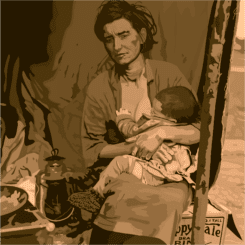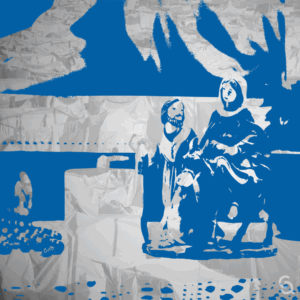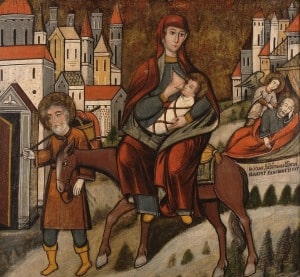
“Pray that your flight be not in the winter…”
It was dusk when I reached the Casa del Peregrino shelter in Mexico City, and the winter chill had already set in. It was November 23, the day after Thanksgiving was celebrated in the U.S.—what many consider the unofficial beginning of the Christmas season.
It felt like a fitting time to meet the Holy Family.
Many people north of the border don’t realize how cold winters can get here. In many parts of Mexico, the temperature drops below zero at night. As I walked down a dark alley toward the shelter, the cold crept up through the soles of my tennis shoes, icy wind sneaking in through an open gap in my jacket.
I rounded a corner and saw a pool of light from an open door, making the interior of the shelter look warm and inviting. A crowd of Central American migrants milled about outside, chatting, eating off of paper plates, smoking, laughing. For many of them, this would be the first night they would sleep indoors after weeks or months spent on the road.
For many, this would be the first night they would sleep indoors after weeks or months spent on the road.
They came from as far as El Salvador and Honduras, nearly 2,000 miles away. They crossed through four countries, sleeping on the street, in parks, next to highways, braving cold and rain and wind and sun, always sticking together as a group. There is safety in numbers.
The crowd was mostly young men, with a handful of women and older migrants. One group at the far end of the patio stuck out: a young married couple. The mother held a baby in her arms. The husband stared at the horizon, uncertainty drawn on his face.
Near a group of reporters, I spotted the shelter’s supervising priest—an unassuming bald man dressed in a thick white sweater, a simple wooden cross hung around his neck. His assistant was taking a list of inventory for the shelter, and I caught his eye.
“Excuse me, do you think I could interview the priest when he gets a chance?”
The young man replied that I could, and introduced himself as Guillermo. “So, what brought you here?” he asked.
“I want to help. Lots of my friends here in Mexico City do, too.” I nodded toward the crowd of migrants. “We want to let these folks know they’re not alone.”
She wrapped him in swaddling clothes and laid him in a manger, because there was no room for them at the inn…
The migrant caravan is a longstanding tradition. Every November, thousands of people leave Central American countries beset by violence and poverty, crossing Mexico as a massive expression of the Via Crucis. In addition to the safety in numbers that comes with such a large group, the caravan exists to bring public attention to the migrants’ cause. They come fleeing violence, hunger, chaos, exploitation. In some cases, they are fleeing certain death.
“I can’t go back to El Salvador,” a young man named Marcos told me. He spoke in the clipped, rapid accent of his homeland. “The mareros are looking for me.”
The Mara Salvatrucha, a brutal gang, killed his brother three years ago. When Marcos refused to pay them off, they staked out his house. One night as he walked home, they emerged from the shadows. They had machetes.
“That’s when they gave me this,” Marcos told me, pulling up the leg of his faded jeans and pointing at a gruesome, jagged scar snaking up his calf. “That’s why I joined the caravan this year. I can never go back home.”
The caravan coincides with the time when families all across Latin America celebrate Las Posadas. People go to each others’ homes, stand outside the door, and and sing a carol asking for entry, commemorating the Holy Family’s search for a place to stay. When the hosts of the Posada open their door and invite the guests in, they symbolically rewrite the course of history.
That is what I was doing at the shelter. I was there to meet with the Holy Family.
“…whatever you did for one of the least of these brothers and sisters of mine, you did for me.”
I am not a fundamentalist by any means. You won’t hear me arguing in favor of a literal six-day creation, or a physical Noah’s Ark. I believe much of the Bible was clearly written as metaphor and poetic hyperbole. One passage, however, I take in a wholly literal sense: Matthew 25.
In the parable of the sheep and the goats, Christ doesn’t say, “Here’s a nifty trick that will make it easier for you to help the poor: just imagine them as me.” There is no simile language of “like,” “similar to,” “as if.” Christ simply said, “As you did to them, you do to me.”
Christ is present in a real sense with the marginalized, the downtrodden and rejected of our world. Much more than a Jewish peasant from the First Century, Christ is a present reality. This shelter on a side street of Mexico City was a place where I knew I would encounter him.
“The Father is almost ready to talk to you now,” Guillermo told me after a half hour. I asked him for the name of the priest in the white sweater.
“Father Alejandro. Alejandro Solalinde.”
“Wait…the Alejandro Solalinde?”
Guillermo nodded.
I had no idea I would be meeting a celebrity. Father Solalinde is a household name in the world of human rights, a tireless advocate for migrants. Since 2007, he has operated a shelter in the southern Mexican town of Ixtepec, a frequent stop on the journey northward. The freight train known as La Bestia passes through town, and with it, thousands of refugees from Central America. For his work, Father Solalinde has been nominated for the Nobel Peace Prize. He has also received regular death threats.
When he walked over and shook my hand, I suddenly got stage fright. “Uh, tell me, Father…” I stumbled over my words. “Tell me about the Caravan. What is the situation like?”
“Things are different this year,” he said gravely. “International law is not being respected. Children have been torn from their mothers. Migrants aren’t being given the chance to request asylum. Meanwhile, things have become much worse in much of Central America. This isn’t just a caravan anymore—it’s an exodus. These people are seeking their Promised Land.”
“Herod was furious, and he gave orders to kill all the boys in Bethlehem…”
After I thanked Father Solalinde for his time, Guillermo invited me to come inside the shelter. It was sparse but clean and orderly, filled with the scent of fresh bleach and detergent, along with the familiar smell of hundreds of tired human bodies. Guillermo introduced me to four men of varying ages. I asked how they had decided to join the Caravan.
“My country’s on the verge of civil war,” said a man from Nicaragua.
“Mine still hasn’t recovered from one,” a Guatemalan said.
A gray-haired man from El Salvador said dryly, “The gangs want to kill my family.”
“Our president is a dictator,” said Oscar, an upbeat young man from Honduras. He described his home country as chaotic, nearly uninhabitable. “If you vote for the ‘wrong’ party, you can’t even get a job. And it’s become so dangerous. You can’t even walk down the street at night like you do here in Mexico.”
Honduras hasn’t always been this way. Its recent instability stems from 2009, when the democratically elected President Zelaya was overthrown by a U.S.-sponsored coup. Since then, thousands of Honduran activists have been murdered by death squads. The murder rate there is one of the highest in the world.
This coup is just the latest in a long history of violent U.S. interventions in Latin America. While pundits and politicians debate building walls and “securing the border,” the U.S. military has crossed southward 56 times over the past century. A disproportionate number of these invasions have taken place in Central America.
Democratic governments have been overthrown, elections tampered with, paramilitary thugs armed and trained, entire nations occupied, all to keep cheap consumer goods on our supermarket shelves. Political and economic control is maintained over the region, by any means possible.
Power purchased with bloodshed.
“So he got up, took the child and his mother during the night and left for Egypt…”
“How did you get here?” I asked Oscar.
“We walked. When we could, we took buses, hitched rides in cars, motorcycles, pickup trucks. Every kind of transportation except elephants and camels,” he chuckled.
The migrants left everything behind and traveled to a strange land, with no idea what sort of welcome they would receive. In many cases, their reception has been harsh. Mexican Federal Police fired rubber bullets at the caravan as they came in from Guatemala. Some groups of middle-class Mexicans have organized marches in Tijuana and Mexico City, claiming that the Hondurans bring crime and disease. Trumpismo a la mexicana.
On the day before I visited the shelter, when much of the caravan was reaching Tijuana, President Trump authorized the U.S. military to use lethal force against them. International observers watched with horror, as the world’s most powerful army prepared to open fire on unarmed refugees. Ironically, this announcement was made on Thanksgiving Day, a holiday commemorating the survival of immigrants in a new land.
Still, ugliness and cruelty have not had the last word, in the U.S. or in Mexico. In southern California, churches of all denominations have opened their doors to refugees. Here in Mexico, there are dozens of shelters like the one I visited. As I chatted with the migrants, a constant flow of volunteers poured past carrying bags of clothing, boxes of toilet paper and food.
Oscar waved his hand at them. “Look at all the support. I feel eternally indebted to Mexico. This is a country that has given me everything. A chance to live, a chance to start again. Hope. We can never lose hope. As long as we’re alive, there is always hope.”
“If someone who has worldly means sees a brother in need and refuses him compassion, how can the love of God remain in him?”
Before leaving the shelter that night, I asked Guillermo how I could help their work.
“Besides donations, these men need jobs. Work. They don’t like being idle. If you know anyone who is hiring, they’re ready to work.”
I promised to put him in touch with my friends who own businesses. “I know a lot of people who don’t live here in Mexico City, though,” I said. “Is there a bank account where people can make donations?”
“Sorry, we don’t accept money. It’s a matter of principle for us.”
“How can we help, then?”
“They have migrants in their own cities, don’t they?” Guillermo asked. I nodded. “Well, in this season of Las Posadas, they can recognize who those migrants are. Remember, when you look into the eyes of one of these migrant brothers and sisters, you are seeing the face of Christ.”
…in this season of Las Posadas, they can recognize who those migrants are. Remember, when you look into the eyes of one of these migrant brothers and sisters, you are seeing the face of Christ.
I thought back to countless Christmases of my childhood, and recalled all the silly disputes that would erupt at my family’s church. Believers refusing to say “Happy Holidays,” or spell Christmas with an X. Quixotic battles to keep a manger scene in front of city hall. Arguments about whether Jesus was actually born on December 25, or whether buying an evergreen tree was a concession to paganism.
Meanwhile, while comfortable Christians continue to argue over such dross and chaff, Jesus is hungry and homeless right now. Not just someone like Jesus, someone who reminds us of him, but Jesus himself. He is on the streets of Tijuana and Mexico City, cold and alone. And each of us must decide how to treat him.
Deliver us from evil, O Lord, and let us not fall into temptation. Let this be our Advent prayer, now and always.
David J. Schmidt is an author and multilingual translator who splits his time between Mexico City and San Diego, CA. He is a proponent of immigrants’ rights and fair trade, and works with worker-owned coops in Mexico to help them develop alternative, fair sources of income. Schmidt is the author of several books in English and Spanish, published in the United States and Mexico. He is also the co-host of the podcast To Russia With Love.
is an author and multilingual translator who splits his time between Mexico City and San Diego, CA. He is a proponent of immigrants’ rights and fair trade, and works with worker-owned coops in Mexico to help them develop alternative, fair sources of income. Schmidt is the author of several books in English and Spanish, published in the United States and Mexico. He is also the co-host of the podcast To Russia With Love.


